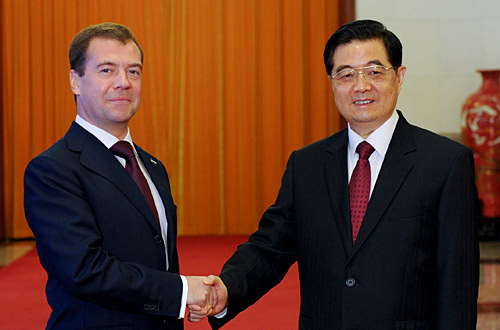|
 |
|
BETTER RELATIONS: Chinese President Hu Jintao meets with visiting Russian President Dmitry Medvedev in Beijing on September 27 (LI XUEREN) |
How similar are China and Russia? They are neighbors, partners and co-founders of the Shanghai Cooperation Organization (SCO). They are also two of the world's major emerging markets. How close is the relationship between China and Russia? The two countries' heads of state have met five times during the past nine months.
From September 26 to 28, Russian President Dmitry Medvedev made a three-day state visit to China at his Chinese counterpart Hu Jintao's invitation. The two nations comprehensively enhanced their strategic partnership and economic coordination during the state visit, Medvedev's second to China since assuming the Russian presidency in May 2008.
Deepened mutual trust
During the three-day visit, the Russian president's schedule was quite full. He visited Beijing, Shanghai and China's northeastern port city of Dalian for one day each. Medvedev chose to begin his state visit in Dalian. There, he met with Chinese and Russian military veterans, who participated in China's War of Resistance Against Japanese Aggression (1937-45), during World War II. Their combined effort underscored the deep bonds between the Russian and Chinese people.
Medvedev talked with Hu, Premier Wen Jiabao, and top legislator Wu Bangguo in Beijing. In Shanghai, he attended Russia's National Pavilion Day at the 2010 World Expo.
The two sides signed two important joint statements during Medvedev's visit: One on comprehensively deepening the strategic partnership of cooperation between the two countries; the other was regarding the 65th anniversary of the end of World War II. In addition, the two countries signed 15 deals on cooperation covering coal, gas supply, energy efficiency, renewable energy, nuclear power, power grids and banking.
Both sides believe the visit is of great significance to the promotion of a bilateral relationship. "This visit is a major event in China-Russia ties of this year," said Hu. When meeting Medvedev, Hu said he was convinced the visit would deepen bilateral strategic exchanges and practical cooperation in all areas, and would be a catalyst for the robust growth of bilateral ties.
"The frequent contact between the two heads of state complies with the interests of the two peoples and will help boost bilateral ties. The weighty agreements just showcase the closer cooperation," Medvedev said.
Analysts said the Russian president's visit shows the importance of the current Sino-Russian relationship.
Qu Xing, President of the China Institute of International Studies, said Medvedev's schedule reflected his understanding of the relationship. The Dalian visit showed his focus on the two countries' history—the two nations battled Japanese troops shoulder to shoulder in northeast China during World War II.
In Beijing, he signed a series of cooperative documents with China and pushed the bilateral partnership to a new height, demonstrating his recognition of current Sino-Russian relations.
His last stop, Shanghai, is at the forefront of China's reform and opening up. Many new technologies, industries and concepts are on display at the World Expo there. Qu said as Russia adjusts its economic structure and seeks economic modernization, it will deepen cooperation with China on new technologies and new industries.
Jia Qingguo, Associate Dean of the School of International Studies of Peking University, said it is very rare for two sides to sign two joint statements during a single visit. It shows that the bilateral relationship is running smoothly and means prospects for future cooperation are bright.
He also said the two sides' joint statements aim to deepen bilateral coordination and strengthen cooperation to promote common development and confirm a common stance. The joint statements "deepen bilateral relations and show clearly the direction of future development," Jia said.
Xing Guangcheng, an expert on Russian studies with the Chinese Academy of Social Sciences (CASS), said the frequent meetings between leaders of the two nations reflect growing trust between them. "The development of the bilateral relationship is going very smoothly," he said.
| 